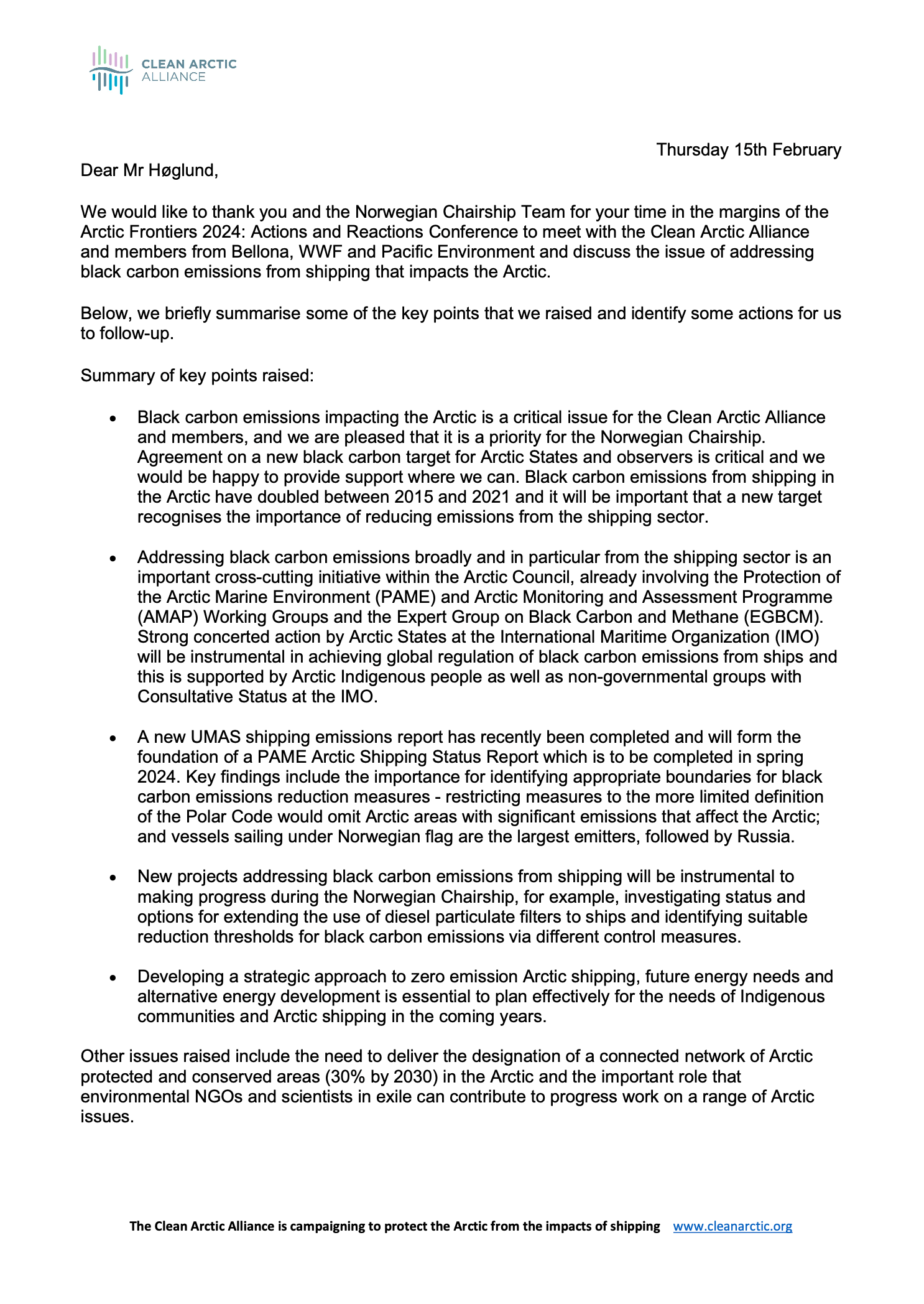
Dear Mr Høglund,
We would like to thank you and the Norwegian Chairship Team for your time in the margins of the Arctic Frontiers 2024: Actions and Reactions Conference to meet with the Clean Arctic Alliance and members from Bellona, WWF and Pacific Environment and discuss the issue of addressing black carbon emissions from shipping that impacts the Arctic.
Below, we briefly summarise some of the key points that we raised and identify some actions for us to follow-up.
Summary of key points raised:
- Black carbon emissions impacting the Arctic is a critical issue for the Clean Arctic Alliance and members, and we are pleased that it is a priority for the Norwegian Chairship. Agreement on a new black carbon target for Arctic States and observers is critical and we would be happy to provide support where we can. Black carbon emissions from shipping in the Arctic have doubled between 2015 and 2021 and it will be important that a new target recognises the importance of reducing emissions from the shipping sector.
- Addressing black carbon emissions broadly and in particular from the shipping sector is an important cross-cutting initiative within the Arctic Council, already involving the Protection of the Arctic Marine Environment (PAME) and Arctic Monitoring and Assessment Programme (AMAP) Working Groups and the Expert Group on Black Carbon and Methane (EGBCM). Strong concerted action by Arctic States at the International Maritime Organization (IMO) will be instrumental in achieving global regulation of black carbon emissions from ships and this is supported by Arctic Indigenous people as well as non-governmental groups with Consultative Status at the IMO.
- A new UMAS shipping emissions report has recently been completed and will form the foundation of a PAME Arctic Shipping Status Report which is to be completed in spring 2024. Key findings include the importance for identifying appropriate boundaries for black carbon emissions reduction measures – restricting measures to the more limited definition of the Polar Code would omit Arctic areas with significant emissions that affect the Arctic; and vessels sailing under Norwegian flag are the largest emitters, followed by Russia.
- New projects addressing black carbon emissions from shipping will be instrumental to making progress during the Norwegian Chairship, for example, investigating status and options for extending the use of diesel particulate filters to ships and identifying suitable reduction thresholds for black carbon emissions via different control measures.
- Developing a strategic approach to zero emission Arctic shipping, future energy needs and alternative energy development is essential to plan effectively for the needs of Indigenous communities and Arctic shipping in the coming years.
Other issues raised include the need to deliver the designation of a connected network of Arctic protected and conserved areas (30% by 2030) in the Arctic and the important role that environmental NGOs and scientists in exile can contribute to progress work on a range of Arctic issues.
The Clean Arctic Alliance is campaigning to protect the Arctic from the impacts of shipping www.cleanarctic.org
Thursday 15th February
In terms of follow-up actions arising from the meeting, there is much that would be valuable and that the Clean Arctic Alliance and it members can develop further, either via their own Observer Status or via discussions with Member States, including:
- develop proposals for possible Arctic Council projects addressing the reduction of black carbon emissions from ships and the future of Arctic shipping, for example,
- Status of diesel particulate filters as a technological option to reduce black carbon emissions from ships,
- Investigation into reduction thresholds of black carbon emissions via different control measures,
- Mapping an Arctic Shipping Vision and Strategy towards 2050 zero emission and biodiversity conservation including the use of green shipping corridors to tackle climate change and protection of biodiversity in the Arctic,
- speak to appropriate Arctic Council members to secure leads for new project proposals,
- consider participating in OECM meeting in Tromsø (14-15 April) and EPPR Workshop in Bodø in 2025,
- develop a proposal for a possible alternative energy project to establish a common fact base on the green shift in the energy sector in the Arctic.
Finally, during the discussion the value of a brainstorming on cross-cutting approaches to address black carbon emissions was briefly mentioned, including the possibility of convening a range of Arctic Council bodies, research institutions and non-governmental organisations to identify and develop common approaches. Is this something that we can help to develop and take further?
Thank you once again for the opportunity to meet in person during the Arctic Frontiers 2024 Conference,
Yours sincerely
Dr Sian Prior
Lead Advisor
Clean Arctic Alliance
E: [email protected]

